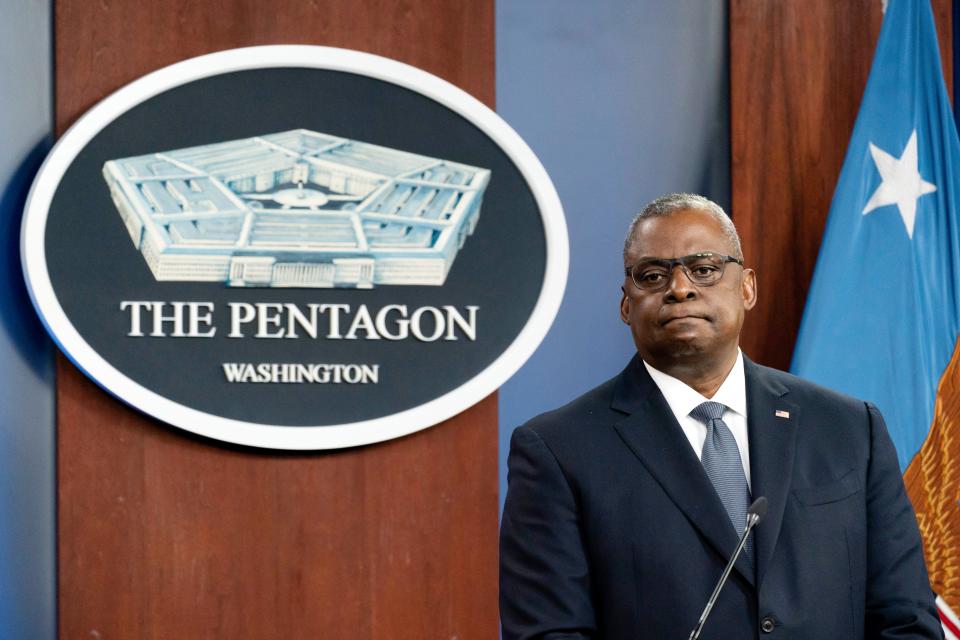Opinion: Where are the detailed Pentagon reports like the one on the Kabul bombing for civilian casualties?
U.S. military leaders held a news conference Friday to describe what happened last summer at the Kabul airport when a suicide bomber detonated during the U.S.-led evacuation of Afghanistan. That day, 13 American service members and more than 150 Afghans were killed.
Equipped with a PowerPoint, a laser pointer and videos of the attack, officials gave a second-by-second breakdown of events. The level of detail was impressive. Especially so because when it comes to other deaths in conflict – those of civilians harmed by U.S. operations – the U.S. military has offered the opposite: immediate denials of harm and questionable investigations.
I have never seen an official Pentagon report on civilian casualties as detailed as the one I watched Friday. In the 20 years since the beginning of the U.S. global counterterrorism campaign, Human Rights Watch has investigated at least 27 incidents of the U.S. killing civilians, and other organizations have documented many more. As far as we know, U.S. military officials were held responsible in only one of them, when a Doctors Without Borders was hit in Kunduz, Afghanistan. Most of the time, mourning families received no acknowledgement of their loved one’s death and no explanation for why it happened.
Afghan refugees needed help. Americans stepped up to say, 'Welcome to your new home.'
The suicide bombing discussed Friday was not the only mass casualty event in Kabul last summer. Fearing a second attack, U.S. officials launched a missile at a car they thought was carrying explosives. But they got it wrong. After 19 days of insisting otherwise, the military announced that the targeted man, Zemari Ahmadi, had been an aid worker. A beloved father, he was killed along with nine others, including seven children.
To determine what happened, the U.S. military graded its own homework and found that, while “mistakes” were made, no one was at fault. No one will be held accountable. The family members still have not received any compensation, nor have they been evacuated to a safe country.
Similar patterns have repeated for too long. The U.S. military kills civilians, denies that they got the wrong person, announces an investigation and finds no one responsible. After a spate of New York Times investigations in the fall showing significant negligence on the part of the Pentagon to look into civilian harm, Secretary of Defense Lloyd Austin pledged last month to “improve upon our efforts to protect civilians.” That pledge is welcome but not enough.
My family finally fled Afghanistan. Nightmare is just beginning for millions left behind.
Inside Task Force Pineapple: How we saved Americans and allies trapped in Afghanistan

Congress must step in. The Senate held a hearing Wednesday on the legal and human costs of drone strikes. It should be asking why, if the Pentagon is able to unravel an event like the Kabul airport suicide bombing to the minute, it cannot or will not do so for its own operations that kill civilians. Certainly there is a “moral imperative” to do so, at least in Secretary Austin’s own words. There is a strategic reason, too, knowing as we do that civilian harm turns populations against the United States.
It's important that the U.S. military took such care to investigate the bombing in Kabul that killed U.S. service members. Their families deserve that transparency and to understand how their loved ones were lost. It’s past time for the U.S. military to offer the same care when addressing civilian harm.
Sarah (Holewinski) Yager is Washington director of Human Rights Watch and formerly served in the State Department and the Joint Staff in the Department of Defense.
You can read diverse opinions from our Board of Contributors and other writers on the Opinion front page, on Twitter @usatodayopinion and in our daily Opinion newsletter. To respond to a column, submit a comment to letters@usatoday.com.
This article originally appeared on USA TODAY: Opinion: Where are Pentagon reports on civilian deaths?

